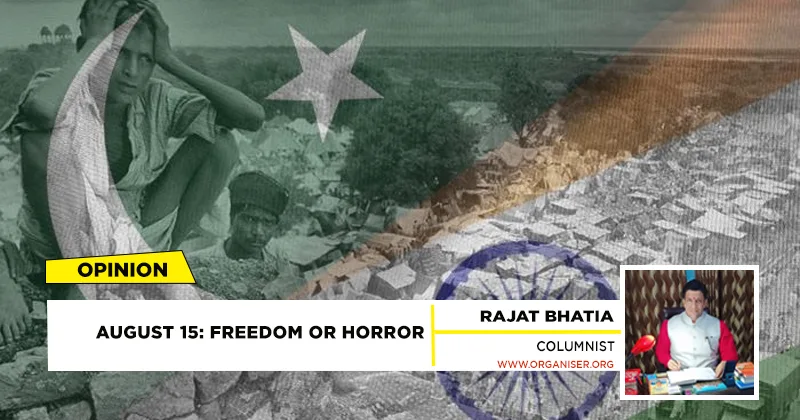On August 15, 1947, there was a festive atmosphere in every village and city because our country India was about to be freed from the chains of slavery. The Congress High Command ordered that such a celebration should be held collectively in every place in the whole of India so that even the celebration of Deepawali would seem less in comparison. The shine of the capital of independent India was many times more than that of Devraj Indra’s Amaravati.
People were dancing with joy amidst the glittering lights all around and thousands of people going towards the Red Fort were cheering the leaders, on whom flowers were also being showered from helicopters. Personalities like Pandit Jawahar Lal Nehru and Lord Mountbatten were walking towards the Red Fort decorated in royal carriages along with thousands of people. The military forces saluted and as always all the leaders also accepted the greetings of the public by waving their hands.

As the time of felicitation and welcoming of independent India was coming closer, the enthusiasm of the people had reached the sky. Giving an eyewitness account of the dark clouds in the bright sky below, Akashvani broadcasted the message that, “See how nature is also ready to welcome the freedom of India, what an auspicious moment it is. What a beautiful rainbow after the rain has become a garland of welcome for the freedom of India.
” (Book: Apni Jaan Ki Baazi Lagkar, page 20) When the speaker of Akashvani was narrating the eyewitness account of natural beauty, in contrast to this captivating scene, a very horrifying and heart-melting scene was going on. Pakistan was born on Indian soil due to the ideology that spread hatred and enmity towards the Indian nation, the consequences of which were borne by the common people away from the leaders of Delhi. Several miles long convoys were coming towards India from places like Lahore, Multan, Lyallpur and Sialkot.
These convoys were completely different from the convoys going to the Red Fort to participate in the celebration of Independence. The convoys coming to India were not groups of people dancing with joy but were a group of people scared of death. The people who were forced to leave everything and run away, left all their wealth far behind them, which seemed almost impossible to get back.
The feet that walked on luxurious palaces and carpets were filled with mud and sludge due to some power-hungry leaders. The heart melted the most on seeing a pregnant woman who gave birth to her child amidst the jungles and convoys. The goons of the Muslim League would attack the convoys going towards India at any time, spread massacres and rapes and the entire administration was complicit in these misdeeds.
The condition of the government convoys and reform centers built by the administration was such that there was neither food to eat nor water to drink. People and children who had become refugees on their own land kept crying for days due to hunger and thirst. Due to not eating food, even the milk of the lactating women had stopped.
The situation was such that many times people had to use their own urine to wet their throats. But the government and the its officials were busy only in the celebration of the Red Fort. Many places in the divided parts of India were burning in flames.
The sky was shaking with the screams of many women, men and children in such burning houses. There were heaps of corpses all around, heads separated from the bodies were rolling on the roads like balls. Little innocent babies were being tossed on spears.
Here too, bullets were fired by the soldiers, but not to salute, but to support the Jihadis who were committing massacre. Women were being gang-raped and sold like looted goods. Married women were becoming widows, children were becoming orphans.
Armed Jihadis of Muslim League would forcibly massacre people on the way and cut off entire trains going to India and write a message for India on the last coaches, “A gift from Pakistan for a free India.” Such scenes made it seem as if humanity had died, but still many scholars believe that no religion teaches hatred. The result of the wickedness of such people was the division of undivided India.
Punjab, which had protected India for hundreds of years, was itself crying for protection, the situation was such that Punjabis were wandering on their own land as refugees. The farmer who fed the entire country was now himself dependent on grains. Children of Punjab, the state of canals and rivers, were yearning for clean drinking water.
But amidst such horrific scenes, there were some courageous scenes of protest, in which women themselves were taking the form of Maa Chandi and destroying the Jihadi demons. (Freedom at Midnight, p. 213) It was midnight between August 14-15 when Pandit Nehru emotionally addressed the Constituent Assembly in the Central Hall of Parliament, “Many years ago we had resolved to achieve this destiny.
We have met that destiny. We have achieved that destiny. Exactly at midnight when the whole world will be sleeping, India will wake up with the yawn of life and freedom.
This is that historic moment when the old era ends and we have all entered the new era.” (Tryst with Destiny) After this address of Nehru, some people were trying to understand his words, rather some were confused by his words. They were not able to understand which destiny Pandit Nehru was talking about.
Did the destiny that the country’s leaders were talking about include the partition of undivided India? Did it also include the genocide taking place in divided India? On the night of independence, the countless eyes of the people were searching for Gandhiji. Where was Gandhiji at the coronation of his beloved disciple Nehru, whom he had made the Prime Minister after asking Sardar Patel to resign? There are many more such questions about Gandhiji and the night of Independence, the answers to which are likely to be buried under many layers of history. The people who considered India as their motherland and holy land expected that Pandit Nehru would make some statement on the massacre caused by partition in his first address to the nation, so that the wounds of the people affected by the tragedy could be healed verbally.
But, the sad thing was that Nehruji did not even mention the massacre. In his address, he only spoke about the celebration of independence and the fulfillment of the dream of independence. The sky shook with the cries of people affected by the tragedy, the dismemberment of the motherland India, and the tragedy, but Nehruji’s heart did not melt, perhaps that is why he did not consider it appropriate to say anything on all these incidents.
On August 14, 15 and 16 speeches of leaders like Dr Rajendra Prasad, Pandit Nehru etc. were given, ceremonies were held but no one expressed sympathy with the riot victims. Not talking about the riots in any speech or ceremony was not just a mistake but a well thought out strategy.
So that the attention of the people of India could be diverted. Let us accept that it may not have been considered right to talk about such a thing in the celebration of independence, but with the passage of time, the Government’s behavior with the refugees strengthened this strategy. The then Government and leftist historians tried their best to hide the partition of India and the massacre somewhere in history, in which they were successful for many years.
But the nationalist elements are working to bring such misdeeds to the public. In the history of India, one Jauhar of Queen Padmavati disturbs the sleep of historians at night, while thousands of mothers and sisters committed many Jauhars to protect their honour, all these facts were bound to shock the historians. When people from Rawalpindi, Lahore, Multan and Sialkot narrated their ordeal in the refugee camps, the Government officials and leaders present there advised them to forget it as a bad dream and celebrate the Independence Day.
Such behaviour of Congress officials and leaders seemed to be an order from their top leadership. India became independent due to the sacrifice of the lives of hundreds of patriots, not just one party but the entire nation has contributed to this. Congress kept talking about independence, perhaps that is why no Congress leader was sentenced to Kalapani or hanged or given life imprisonment.
The role of this party in making India independent is a matter of contemplation..



















